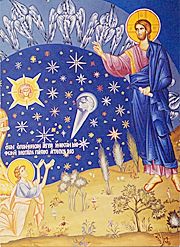“From non-existence, you called us into being…”
Warning: Undefined property: linknotes::$are_links in /var/www/vhosts/basil/kbsite/blog/wp-content/plugins/linknotes.php on line 73
 The first week of Lent (called “the Great Fast” in the Byzantine rite) always reminds me of the doctrine of creation and the various discussions that spring from it, because our scripture readings are from the beginning of Genesis (along with the opening of the Prophet Isaiah and the Proverbs of Solomon). I was thinking about writing about my reflections this year, and as it turns out, Archpriest John Breck has beaten me to it with a wonderful reflection on the stories of creation in Genesis.
The first week of Lent (called “the Great Fast” in the Byzantine rite) always reminds me of the doctrine of creation and the various discussions that spring from it, because our scripture readings are from the beginning of Genesis (along with the opening of the Prophet Isaiah and the Proverbs of Solomon). I was thinking about writing about my reflections this year, and as it turns out, Archpriest John Breck has beaten me to it with a wonderful reflection on the stories of creation in Genesis.
He begins with the most important point, that of our contingency — our complete dependence on God, without whom we would be nothing:
The concept of “nothingness” is impossible for us to grasp. “Nothingness” suggests a void, an emptiness, bounded by something. Yet nothing existed to circumscribe that void or provide contrast to that emptiness. Nothingness is not just the absence of being; it is its denial, its rejection. It is an absolute negation, immeasurable and incomprehensible. It is non-existence, non-being, a negative power that by its very nature is devoid of all meaning , purpose or hope. As such, nothingness finds its closest human analogy in despair.
Then suddenly, “in the beginning” there was something. In that timeless moment, from a locus that transcends every notion of space or dimension, God created ex nihilo. He fashioned being from non-being, space-time from non-existence. Out of that beginning, God – who is Himself the arche or ultimate beginning, principle and source of all that is – brought forth the heavens and the earth.
The idea of non-being as a “power” seems a little strong, as if something existed outside the holy Trinity which was negating being. If “nothingness is not just the absence of being; it is its denial, its rejection,” then an agent must be denying and rejecting.
The agent here, though, is not pre-existing but created along with the cosmos: It is I. I am the agent who rejects God’s life-giving existence and denies my own being. I fear death and so I choose death over life, because that is the ultimate meaning of our freedom. We are free to choose life, the life that is communion with God, or we are free to choose death, to embrace the nothingness from which we are created. This is the death that the first man chose first, passing on mortality to us all. We are born to die, and so we act in fear of that death.
That is why, in the Eastern tradition, death is the enemy that is overthrown. Satan? Sure, he’s a major player in the drama. But death is the power that kept us bound, the power that keeps us from hitting the mark (hamartia, miss the mark, usually translated as “sin”) and keeps persuading us to live in death’s dominion rather than die to ourselves and live in God’s resplendent new creation.
That is why the Christian faith can be summed up in these words: Christ is risen from the dead, trampling death by death, and on those in the grave bestowing life.
It is as an aside that Fr. John mentions the “tedious” arguments between “‘creationists’ and ‘evolutionists'”:
These opening verses are not meant to describe historical process or provide a scientific explanation for the appearance and development of the world and human life. The passage says nothing that can be exploited one way or another in the tedious debate between “creationists” and “evolutionists.” Its concern is not with historiography or paleontology, and its curious chronology (water existed before heaven or earth, living things appeared on earth before creation of the sun and moon) should not trouble the minds of any but those who insist on reading the narrative as a description of cosmological or biological development. The Genesis creation story is not concerned with scientifically determinable events. A we shall stress in the next column, it is concerned with salvation history, the creating and redeeming work of God, from the first creation to the last.
As the polarization intensifies in our schools and legislatures between “believers” and “Darwinists,” it is important for us to remember this point. Increasingly, Christian scientists are coming to see that this is a false choice, that on the question of the origin and development of species there is no necessary conflict between the biblical witness on the one hand and the findings of geologists, paleontologists and molecular biologists on the other. [See in this regard Francis Collins’ recent work, The Language of God (Free Press, 2006).] “Young earth” theorists and fundamentalists of various stripes will reject this point, as will those who insist on the total “randomness” of mutations in the process of natural selection. Evolutionary process (if not Darwinian theory in all its details) has been confirmed by recent studies of DNA, the genetic code of living organisms. Yet this need not call into question the basic conviction that the Creator of all things is God, that God created ex nihilo, that He infuses all things with ultimate meaning and purpose, and that apparent randomness conforms wholly, if for us imperceptibly, to His divine will.
Read all of Fr. John’s article: OCA – “Life in Christ” Articles
